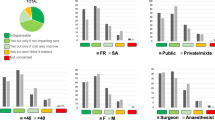Abstract
Background
Carbon emissions are responsible for global warming. Countries around the world are trying to reduce carbon emission.
Purpose
This article throws light on carbon neutrality and the need of reducing carbon emissions.
Methods
Operating theatre environment is a site of carbon emissions. Identifying sources and ways to reducing carbon emission by surgeons is a start to achieve a greener surgical environment.
Results
The article discusses the aforementioned and the need to achieve better carbon profile of surgical setups without compromising patient safety.
Conclusion
Global warming is at the forefront of most industries today. The medical field is one such industry which needs to look into the carbon emissions on a day-to-day basis. Reducing sources of carbon emissions will make operating theatres more eco-friendly.
Similar content being viewed by others
References
Costello A, Abbas M, Allen A, Ball S, et al. Managing the health effects of climate change: Lancet and University College London Institute for Global Health Commission. Lancet. 2009;373(9676):1693-733. https://doi.org/10.1016/S0140-6736(09)60935-1. Erratum in: Lancet. 2009;373(9682):2200. PMID: 19447250
MacNeill AJ, Lillywhite R, Brown CJ. The impact of surgery on global climate: a carbon footprinting study of operating theatres in three health systems. Lancet Planet Health. 2017;1(9):e381–8. https://doi.org/10.1016/S2542-5196(17)30162-6. (Epub 2017 Dec 8 PMID: 29851650).
Rizan C, Steinbach I, Nicholson R, Lillywhite R, Reed M, Bhutta MF. The carbon footprint of surgical operations: a systematic review. Ann Surg. 2020;272(6):986–95. https://doi.org/10.1097/SLA.0000000000003951. (PMID: 32516230).
Pradere B, Mallet R, de La Taille A, Bladou F, et al. Sustainability task force of the french association of urology. Climate-smart actions in the operating theatre for improving sustainability practices: a systematic review. Eur Urol. 2023;83(4):331–42. https://doi.org/10.1016/j.eururo.2022.01.027. (Epub 2022 Feb 10 PMID: 35151515).
Aldoori J, Hartley J, MacFie J. Sustainable surgery: in and out of the operating theatre. Br J Surg. 2021;108(6):e219–20. https://doi.org/10.1093/bjs/znab073. (PMID: 33713111).
Power NE, Silberstein JL, Ghoneim TP, Guillonneau B, Touijer KA. Environmental impact of minimally invasive surgery in the United States: an estimate of the carbon dioxide footprint. J Endourol. 2012;26(12):1639–44. https://doi.org/10.1089/end.2012.0298. (Epub 2012 Oct 16 PMID: 22845049 PMCID: PMC3521130).
Woods DL, McAndrew T, Nevadunsky N, Hou JY, et al. Carbon footprint of robotically-assisted laparoscopy, laparoscopy and laparotomy: a comparison. Int J Med Robot. 2015;11(4):406–12. https://doi.org/10.1002/rcs.1640. (Epub 2015 Feb 22 PMID: 25708320).
Papadopoulou A, Kumar NS, Vanhoestenberghe A, Francis NK. Environmental sustainability in robotic and laparoscopic surgery: systematic review. Br J Surg. 2022;109(10):921–32. https://doi.org/10.1093/bjs/znac191. (PMID: 35726503).
Sheetz KH, Claflin J, Dimick JB. Trends in the adoption of robotic surgery for common surgical procedures. JAMA Netw Open. 2020;3(1): e1918911. https://doi.org/10.1001/jamanetworkopen.2019.18911.
Dzau VJ, Levine R, Barrett G, Witty A. Decarbonizing the US Health Sector—a call to action. N Engl J Med. 2021;385(23):2117–9. https://doi.org/10.1056/NEJMp2115675. (Epub 2021 Oct 13 PMID: 34644470).
Chan KS, Lo HY, Shelat VG. Carbon footprints in minimally invasive surgery: good patient outcomes, but costly for the environment. World J Gastrointest Surg. 2023;15(7):1277–85. https://doi.org/10.4240/wjgs.v15.i7.1277. (PMID: 37555111).
Author information
Authors and Affiliations
Corresponding author
Ethics declarations
Conflict of interest
There are no conflict of interest and no funding.
Informed Consent
Informed consent was obtained from all individual participants included in the study.
Additional information
Publisher's Note
Springer Nature remains neutral with regard to jurisdictional claims in published maps and institutional affiliations.
Gaurav S. Desai is a MS FCPS.
Rights and permissions
Springer Nature or its licensor (e.g. a society or other partner) holds exclusive rights to this article under a publishing agreement with the author(s) or other rightsholder(s); author self-archiving of the accepted manuscript version of this article is solely governed by the terms of such publishing agreement and applicable law.
About this article
Cite this article
Desai, G.S. The Carbon-Neutral Operating Theatre. J Obstet Gynecol India (2024). https://doi.org/10.1007/s13224-024-01949-x
Received:
Accepted:
Published:
DOI: https://doi.org/10.1007/s13224-024-01949-x




